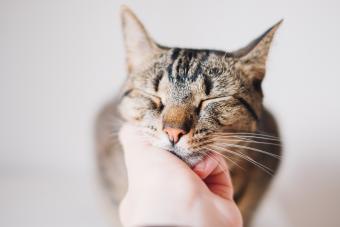
Most cats sound like a Harley Davidson revving when they purr. You fill their bowl? Prrrr. Give them a pet? Prrrrr. So if your cat doesn’t purr, it’s understandable you wonder why. Don’t worry too much, because this could be completely normal for them. Sometimes, cats don’t purr due to their upbringing, or it might just be a personal preference. But there’s always a chance it could be related to their health. Explore the possible reasons behind the absence of this behavior to find out why your cat doesn’t purr.
1. They Communicate Other Ways
Cats communicate using almost 100 different sounds. So some cats just don’t purr and instead trill, chirp, and mew to express their joy. Plus, there are plenty of non-verbal ways they can communicate, like with their tail. If your cat doesn’t purr, watch for other happy cues that show they’re content.
2. They Were a Feral Cat
Some people say that feral cats don’t purr as much as other domesticated kitties. Kittens purr as a way to tell their mother where they are or that they need something. Unfortunately, predators can also hear the purrs, so feral mothers might teach their kittens to stay quiet in order to avoid predators. If your cat was feral for a good chunk of their life, that could explain why they don’t purr like other cats.
3. They’re Stressed
Purring is generally a happy sound in cats, so not purring could mean that your cat is stressed. This is especially the case if you’re petting your cat or doing something that they usually like, but they just don’t purr like usual.
Maybe something has changed in their environment like you added a new pet to the household or you just moved somewhere new. Look for other signs of stress, like hiding, changes in appetite, over grooming, or urinating outside of the litter box. Then, take action to increase their calm.
Oddly enough, some cats purr when they are stressed or in pain as a self-soothing technique.
4. They’re Sick
If your cat used to purr up a storm and just suddenly stopped, they might not be feeling good. Cats are really good at hiding signs of illness as a survival instinct, so even if you don’t see any obvious signs that they’re sick, something might be brewing. Keep an eye out for other subtle signs and bring your feline friend to the vet to make sure there’s nothing concerning going on.
5. They Have Damaged Vocal Cords
An injury (one that’s old or new) to the vocal cords could explain why your cat doesn’t purr. If the voice box can’t vibrate correctly, they can’t create that classic purr sound. Birth defects affecting the throat and larynx can also have the same effect. This is pretty rare, but possible.
6. They Never Learned How
Kittens who were orphaned and raised without any other cats might not have ever learned how to purr. Usually, kittens start purring when they’re just a few days old as a way to communicate with their mother, since they can’t hear or see anything. They feel the vibration of her purr and use that to find her. But it’s not unusual for a kitten to be abandoned and bottle-raised before they learn this behavior.
Can you teach a cat to purr? No, not really. But you can try to elicit a purr through petting, cheek scratches, or playing.
7. Their Purrs Are Too Quiet to Be Heard
Maybe your cat does purr, but they’re too quiet to be heard or felt. Just as humans naturally have different voice volumes (we all have that super loud friend and the incredibly quiet one), your cat might just have a really quiet purr.
If they’ll let you, try to bring your ear super close to their throat and chest to listen for a quiet hum. You can also gently place your hand on their neck to feel for the vibration of the purr.
Look for Other Signs of Happiness
It might sound strange, but some cats just don’t purr. If your cat doesn’t but otherwise seems happy, comfortable, and healthy, it’s probably nothing to worry about. But it’s never a bad idea to have them examined to rule out something hidden, like illness or stress, that could keep them from purring. That way, you can rest easy knowing they're just not a purrer, and that's OK.







